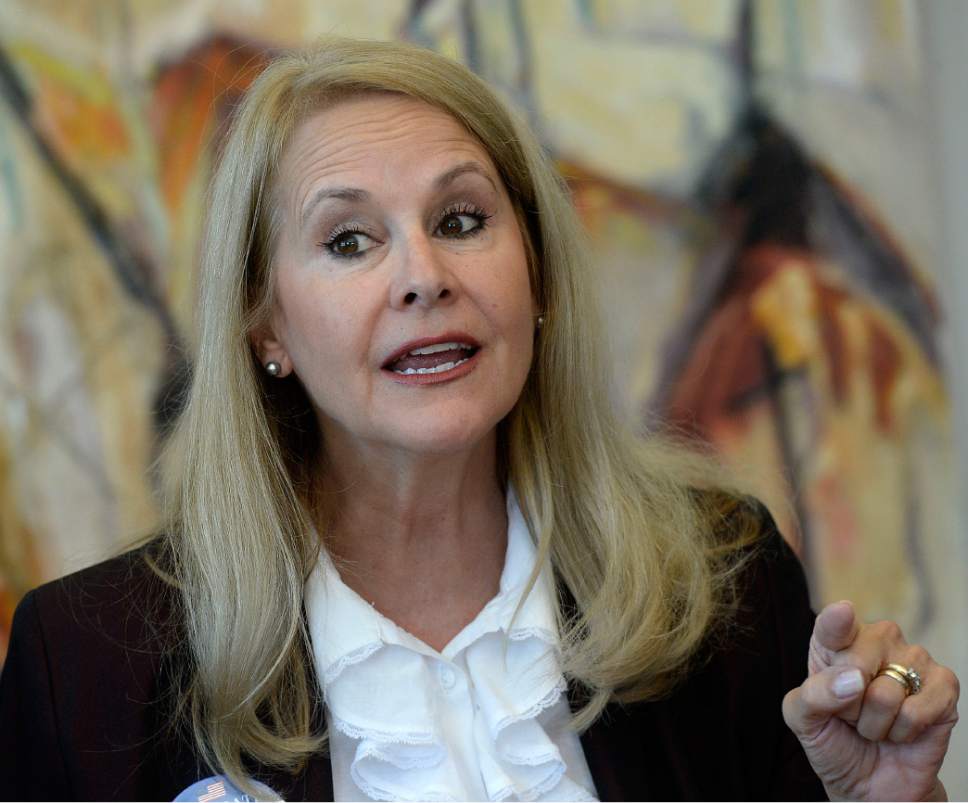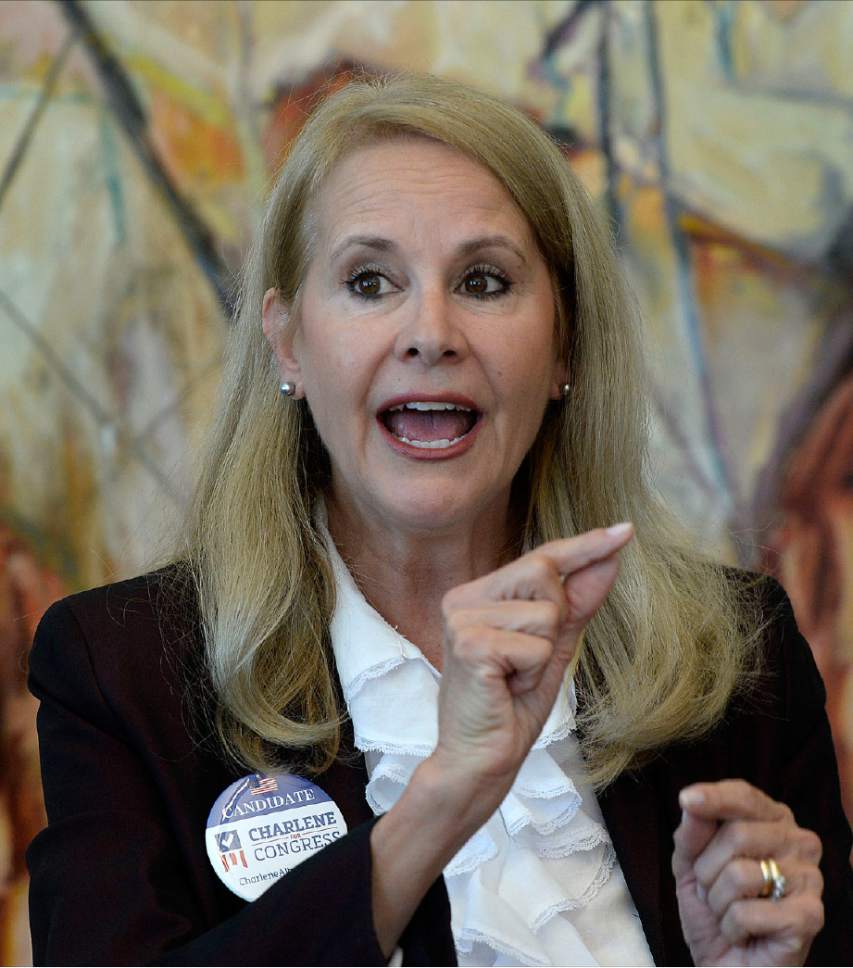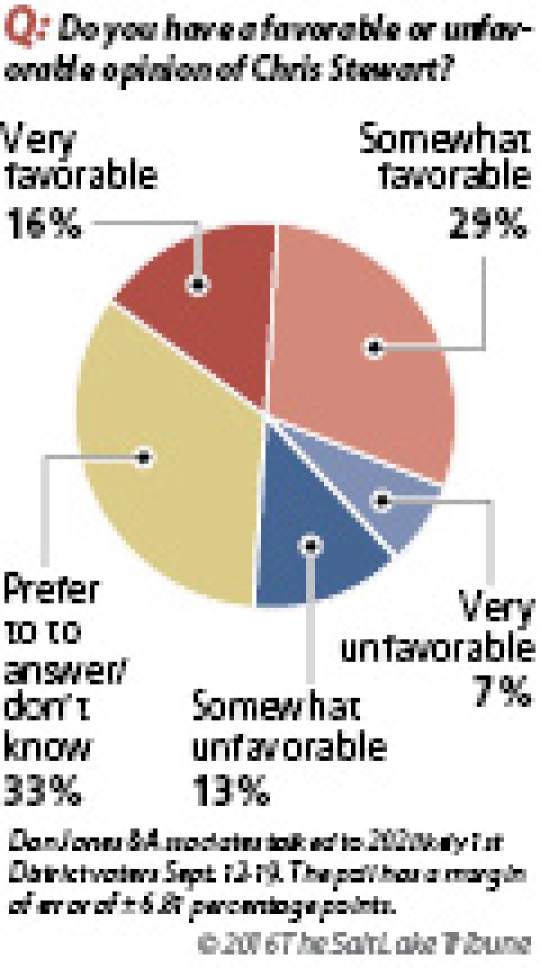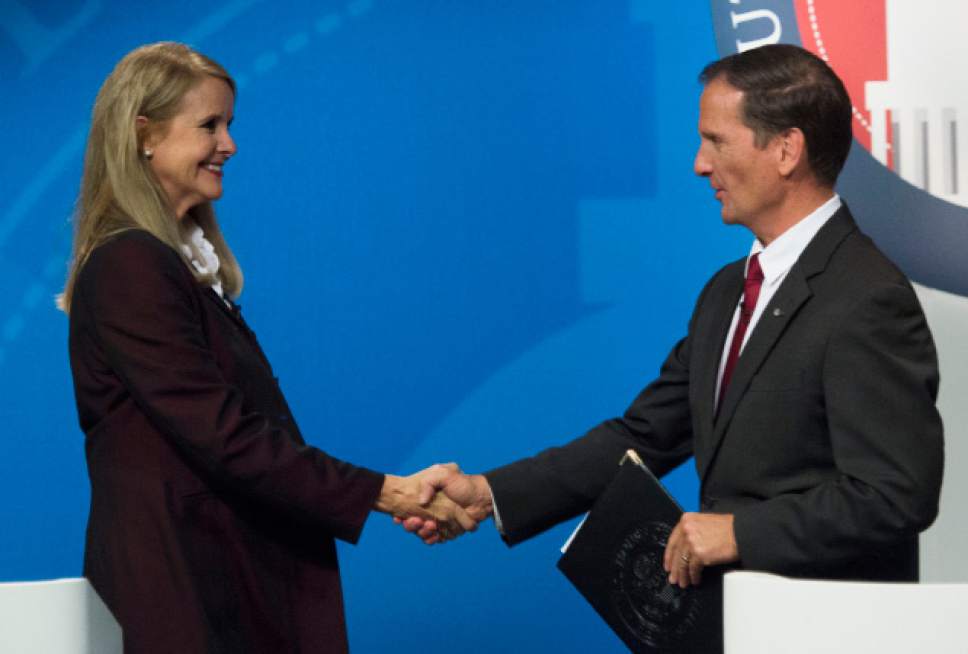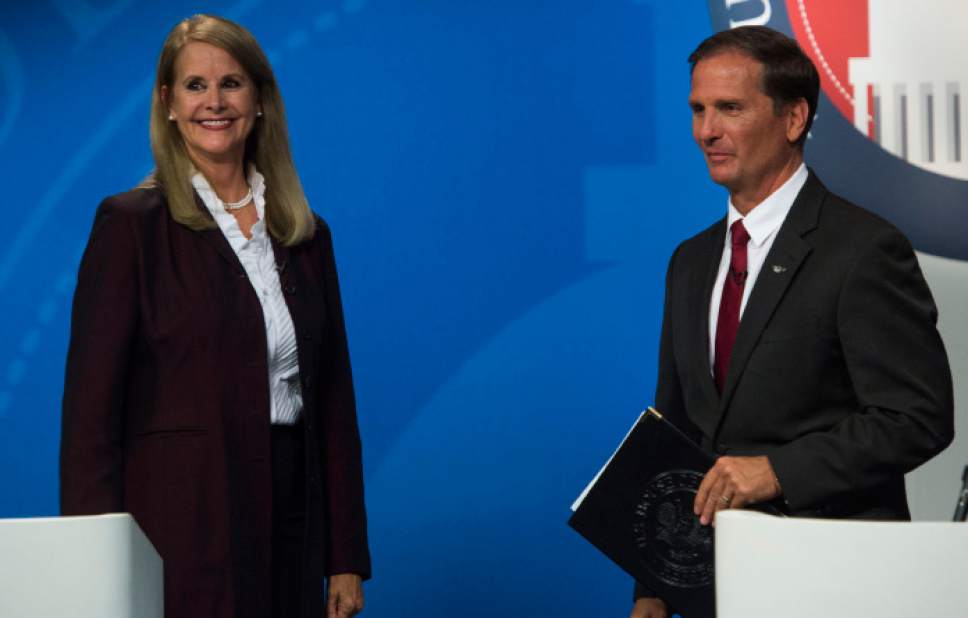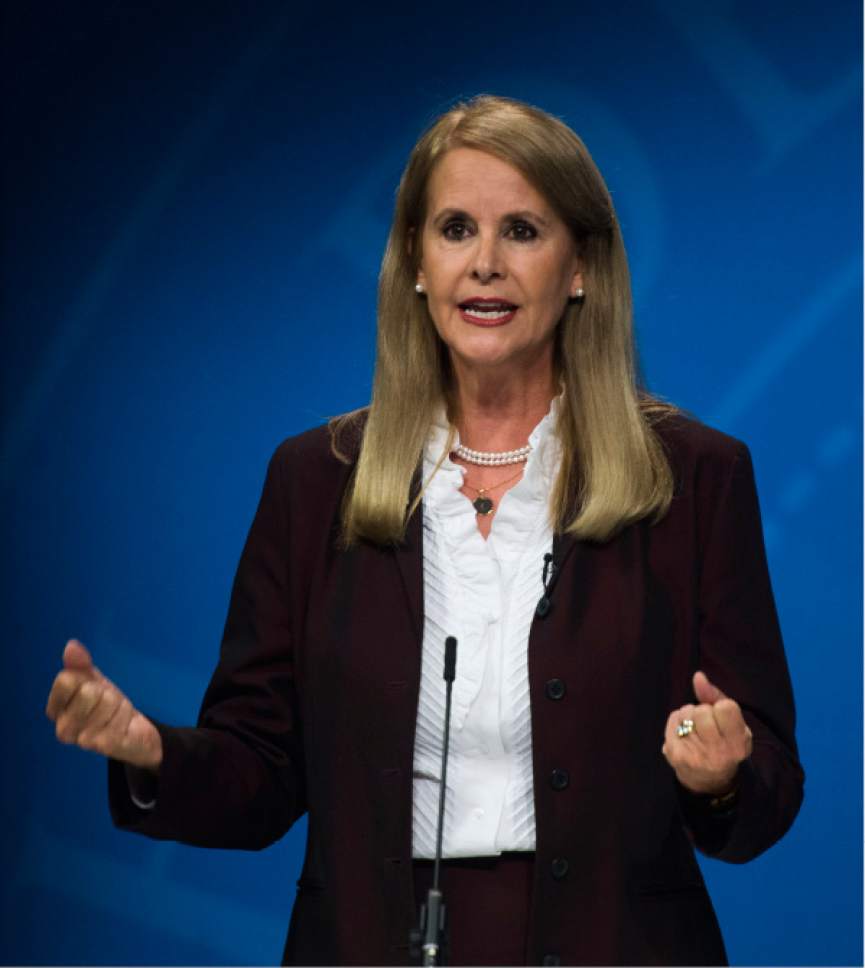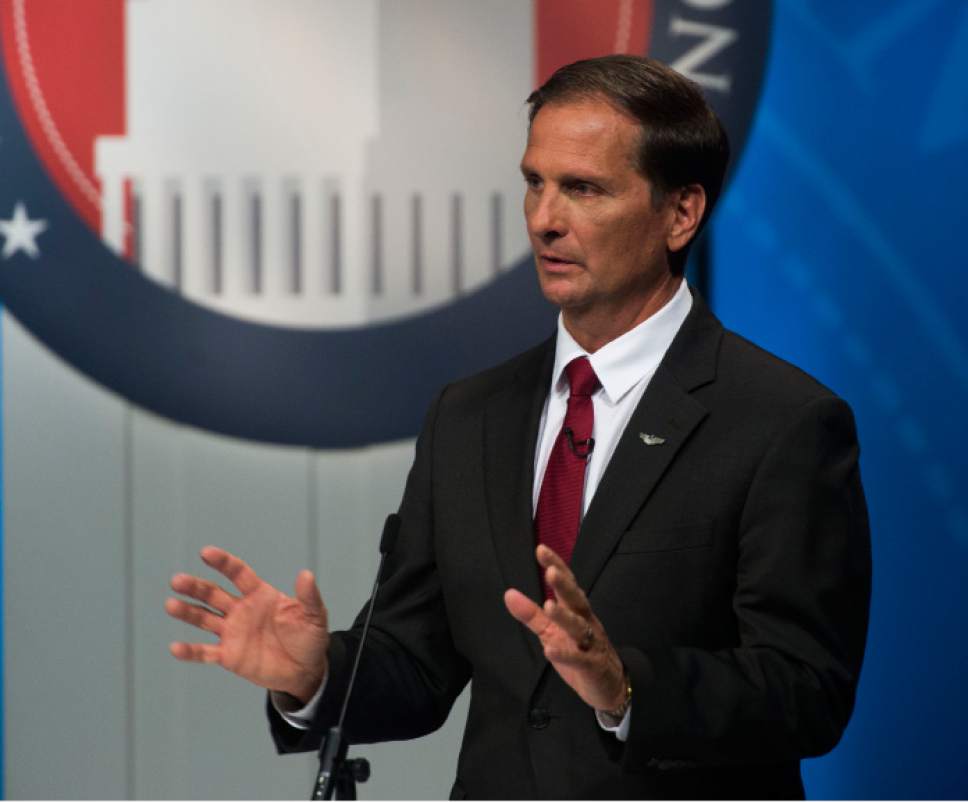This is an archived article that was published on sltrib.com in 2016, and information in the article may be outdated. It is provided only for personal research purposes and may not be reprinted.
U.S. Rep. Chris Stewart, R-Utah, flew rescue helicopters and the B-1 bomber for the Air Force for 14 years. Now he is piloting through plenty of political flak fired up by his Democratic rival, Charlene Albarran.
But he's dropping a few bombs her way, too.
She says he has done nothing in Congress, including passing no bills in his four years there. She questions whether he cares about women and attacks his doubts about climate change. She says he's out of tune with the district.
Stewart counters that Albarran doesn't even really live in the district and is out of touch with its residents. He says his challenger is less than honest in her assertions.
That makes for some sharp and lively contrasts in the 2nd Congressional District race.
—
Legislative record • Stewart "missed 66 votes in Congress. He has not passed a bill. I don't see anything that's getting done," says Albarran, who founded three businesses and two foundations to help the homeless. She was both a former Miss Idaho America and Miss Idaho USA and was an international model.
"I get things done," she says, echoing her campaign slogan. "I'm not a career politician. But I know how to run a business" and accomplish goals.
"Criticism of my voting record is silly," Stewart responds. He says he has cast nearly 3,000 votes in Congress, and the 66 he missed is a small percentage that largely "were a result of important family obligations including taking care of my wife after surgery and when my children came home from LDS missions."
Stewart says more than one method exists to enact legislation. While he has not passed stand-alone bills through Congress, he says he often attaches what he wants to other measures. He says he uses his position on the House Appropriations Committee to aid that.
"The reality is, I am one of the most effective legislators we have," he says. "I have passed many pieces of legislation. As an appropriator, that legislation is often an amendment or provision in a larger legislative package." He says that includes a plan to fund the fight against the Zika virus and provisions to address wild-horse populations.
—
Residency • Stewart charged during a debate that Albarran does not live in the 2nd District, instead residing in a multimillion-dollar home in Park City in the 1st District. She says he is wrong; she moved to an apartment in Salt Lake City shortly after filing for office.
"It matters because do you know us? Are you our neighbor? Do you understand our problems?" Stewart said. "I just want you to be honest with the people."
She says she stays in her Park City home "about two days a month." She says she knows the 2nd District and Salt Lake City well, and started an airline rental business and a philanthropy for the homeless there.
But she insisted during their one televised debate that portions of Park City are in the 2nd District, and includes some of her neighbors there. Boundary maps show that none of Park City is in that district.
Albarran says the argument is moot because the Constitution does not require a House member to live in the district. U.S. Rep. Jason Chaffetz, R-Utah, and former Rep. Jim Matheson, D-Utah, at times lived outside their districts.
—
Women and violence • Albarran, a mother and grandmother who founded the R&C Foundation for homeless women in Utah, takes aim at Stewart on helping women.
"He voted against an act to protect women against violence, and I opened up a safe home to protect women against violence," she says. "We're very different there."
Stewart says his problem with the bill was its focus on Washington solutions.
"I am a father of two daughters and have several granddaughters. I obviously want to protect them against violence," Stewart responds. "I believe that is most effectively done at the state level, where money can be more directly spent on women and children in desperate need, not funneled through federal bureaucracy."
—
Climate change • Albarran, who describes herself as a clean-air advocate, attacks Stewart for sponsoring HR 1422. She decries his legislation as an attempt "to prohibit scientists from testifying about clean air."
Stewart says Albarran should read his bill more closely. "It does not prevent scientists from testifying, but rather limits scientists' ability to peer-review their own work."
Albarran says global warming "is proven," and "we need to start moving toward clean energy."
"Climate change is real," Stewart says. "Fossil fuels may be contributing to climate change. The problem is, as the EPA administrator admitted to me in her congressional testimony, we don't know how much."
He says, "The more important question is whether the American people are willing to accept dramatically higher energy costs and slower economic growth. And where clean air is a challenge — it's far more likely to be solved by technological improvements and the efforts of local governments than by federal involvement."
—
Immigration • Albarran met her husband, who is from Mexico but now is a U.S. citizen, when they were graduate students in Idaho. She lived in Mexico off and on for about 15 years while her husband worked for a family business.
She speaks Spanish fluently, and prints her newsletters in English and Spanish. She has a bit of an accent when she speaks English that almost sounds Latino, but says it actually comes more from her French-Canadian mother who immigrated via Wisconsin (which has its own distinct accent).
The name Albarran, according to ancestry.com, also comes from a medieval Spanish nickname for foreigners or aliens. She says the immigrants in her life give her some different perspective.
Albarran says the U.S. should consider a pathway to citizenship for undocumented immigrants if they have no criminal record. "If we see that they have been in business, that they have been paying taxes, that they are upstanding citizens, have no criminal record of any kind, I think we can look at them."
Stewart also says it is unrealistic and impossible to deport 12 million undocumented immigrants, but he wants them to face penalties before they receive permission to stay.
"Those who have been living here illegally should have to come out of the shadows to pay appropriate fines, penalties and taxes, and then I believe they can be given some sort of legal status to stay in the country. I do not support a special pathway to citizenship," he says. "If they want to become a citizen, they should return to their country of origin and get in line with every one else who is doing it the right way."
—
Gun laws • While both candidates support gun rights, Albarran would like to tighten regulations while Stewart generally opposes them.
"More strict gun restrictions have proven to be ineffective in stopping violence," Stewart says. "Banning assault weapons or large magazines would not help."
Albarran disagrees. "I haven't talked to a hunter yet who needs an automatic weapon to go hunting," and says assault firearms and large magazines are "only meant for a weapon of war."
—
Presidency • Each candidate takes shots at the other over presidential endorsements.
"The congressman had actually called Donald Trump our modern-day Mussolini, then three weeks later endorsed him," Albarran says. "We wonder, is he standing up for the people of Utah … or does he have more allegiance to the Republican Party?"
Stewart has since called for Trump to withdraw, after a recording emerged of him bragging about groping women.
Meanwhile, Stewart says of Democratic nominee Hillary Clinton, who is supported by Albarran, "I know she's a liar. I know she's corrupt."
—
Service • The two list different reasons why they are running.
Albarran says she is doing so "because I get things done and I want to be a voice for the people that feel like they haven't had a voice in a long time."
Albarran contends many groups she talks to — from Pacific Islanders and Latinos to union members and rural residents — "say they have never been visited by a congressman and no one listens to them."
She vows, "I am listening to them, and they have a voice. They just have no one to speak up for them about their issues."
She adds her life has taught her to work hard and deal with people from many backgrounds. She used scholarships from winning Miss Idaho USA in 1975 and Miss Idaho America in 1977 to go to college. At the same time, she did modeling work in France, Italy, Germany, New York and Los Angeles.
She earned a degree in math and statistics. She taught computer programming at Boise State University.
Stewart says he is running because "our country is facing difficult challenges, and I want to stay in the fight to solve some of the country's problems. I want to work every day to make sure we are leaving a bright future for our children and grandchildren." He points to his committee assignments as important perches from which to serve Utah's interests.
"My background as a small-business owner, an Air Force officer and New York Times best-selling author has given me unique experiences to be effective in Congress," he says. His New York Times best-sellers include, "My Story: Elizabeth Smart," "7 Tipping Points That Saved the World," and "7 Miracles That Saved America."
"I sit on the powerful Appropriations Committee and am one of 13 Republicans on the coveted House Intelligence Committee," he says, adding that "growing up on a dairy farm in Cache Valley, I quickly learned the value of hard work."
—
Finances, support • Albarran's campaign is largely self-financed. She has personally donated $351,000 of the $398,000 she raised through June 30. Of the $613,000 that Stewart raised, $372,00 came from political-action committees and $240,000 from individuals.
Polls have shown Stewart with about a 30-point lead over Albarran.





